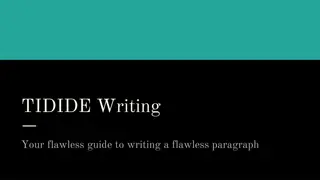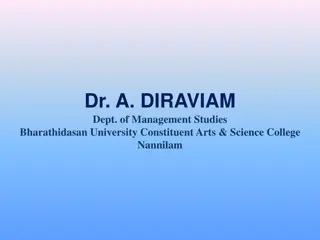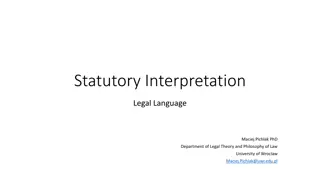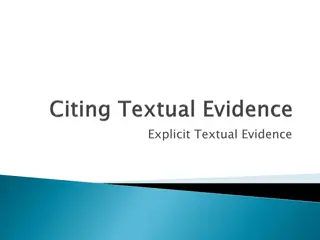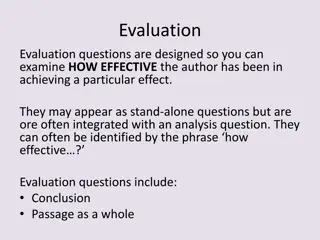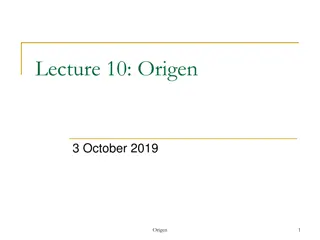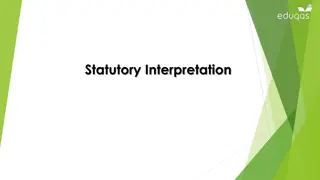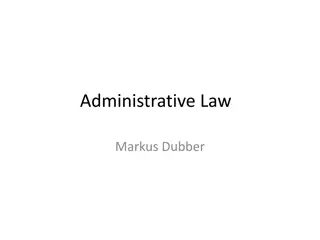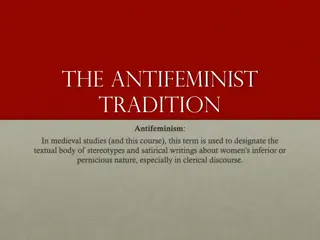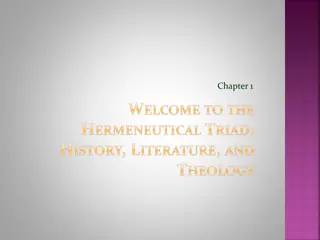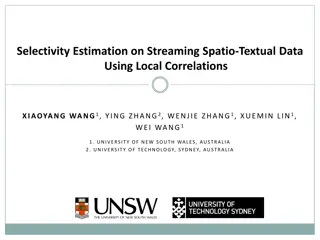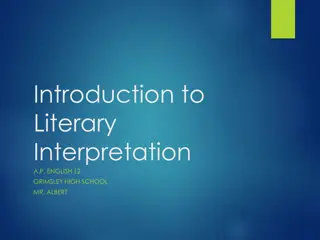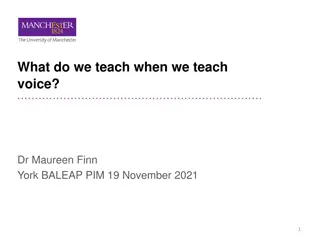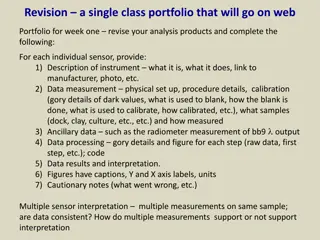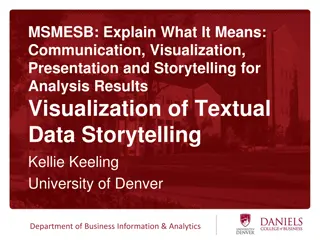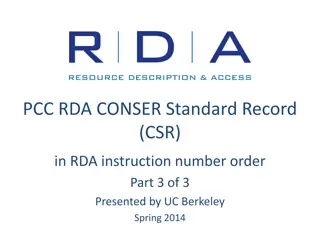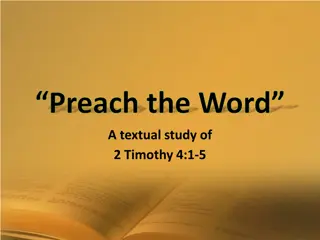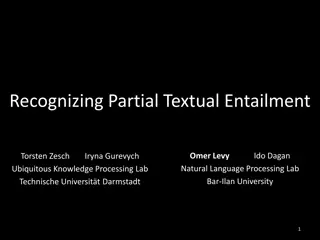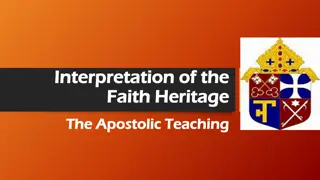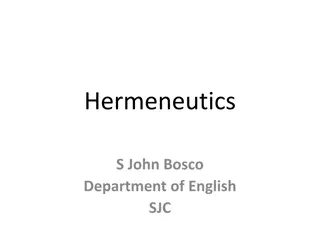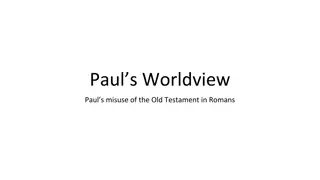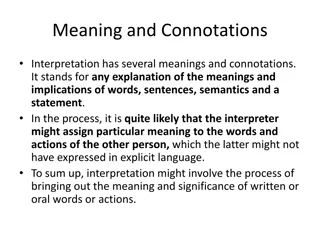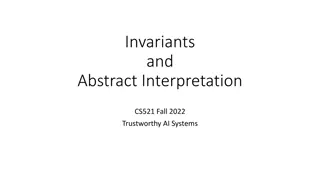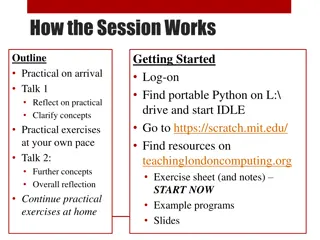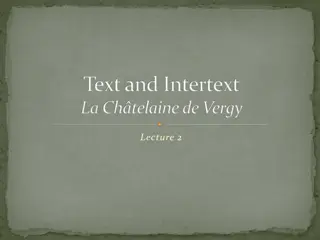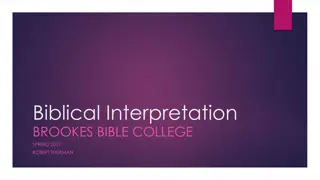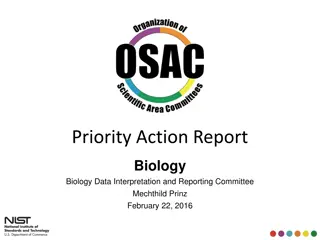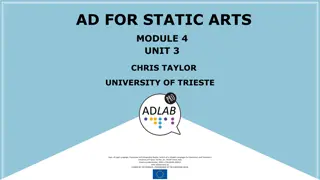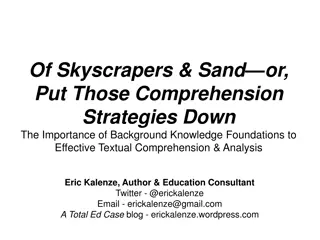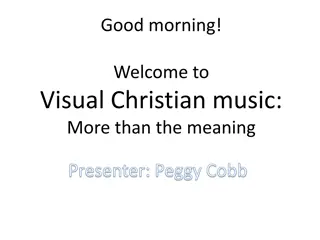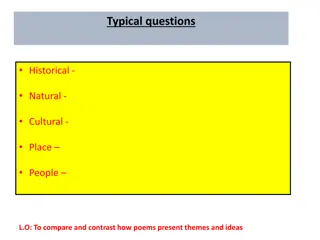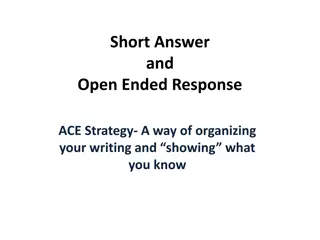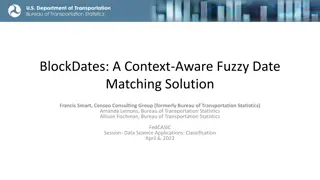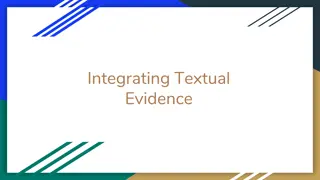Interpretation
Interpretation in research methodology involves drawing inferences from collected data, establishing continuity in research, and developing explanatory concepts for future studies. It helps researchers understand abstract principles, make predictions, and maintain research continuity. Interpretation
4 views • 5 slides
Mastering Topic Sentences and Textual Evidence in Academic Writing
Learn how to craft effective topic sentences for your paragraphs, serving as mini-theses and providing a clear roadmap for your writing. Understand the importance of inference and textual evidence to support your ideas with relevant quotes and facts. Enhance your academic writing skills by mastering
0 views • 20 slides
Understanding Potential Uplift Interpretation in ERCOT Protocols
ERCOT's Potential Uplift Interpretation Protocol defines Potential Uplift as the potential uplift to the Counter-Party based on short payments. The protocol outlines calculations and clarifies language ambiguity to ensure accurate interpretation. ERCOT seeks market feedback for further clarification
1 views • 6 slides
Understanding Research Interpretation and Report Writing in Management Studies
Interpretation in research involves drawing inferences from collected facts to find broader meanings of findings. Techniques such as generalization, concept formulation, and consulting experts help ensure correct interpretation. Writing research reports is a crucial component, requiring logical anal
0 views • 25 slides
Understanding Statutory Interpretation in Legal Context
Explore the intricacies of statutory interpretation, linguistic and non-linguistic methods, and types of interpretation in legal contexts. Uncover the significance of legal reasoning, historical perspectives, and comparisons between Anglo-Saxon and Continental legal cultures. Delve into the complexi
1 views • 17 slides
Mastering Explicit Textual Evidence in Reading Comprehension
Enhancing reading comprehension by utilizing explicit textual evidence to support ideas and opinions about the text. Learn how to clearly state ideas, specify text references, and comment on evidence to bolster your interpretations effectively.
0 views • 15 slides
Analysis of Evaluation and Conclusion Questions in Textual Analysis
Evaluation and Conclusion questions play a crucial role in assessing the effectiveness of an author in achieving specific effects and summarizing key points in a passage. These types of questions are commonly found in textual analysis tasks to evaluate the success of conveying ideas and themes. Eval
0 views • 9 slides
Advanced Methods of Interpretation: Hermeneutics and Structuralism Lecture at Masaryk University
Understanding interpretation in cultural sociology through hermeneutics and structuralism is explored in Lecture III by Dr. Werner Binder at Masaryk University. The lecture delves into the art of interpretation, focusing on classical hermeneutics, Friedrich Schleiermacher's romantic hermeneutics, an
1 views • 37 slides
Understanding Exegesis and Hermeneutics in Origen's Interpretation of Scripture
Origen, a prominent early Christian theologian, delved into various types of exegesis to interpret scripture, including textual analysis, allegory, and moral teachings. His insights on the literal and spiritual understanding of scripture, along with his views on martyrdom and the restoration of all
1 views • 21 slides
Understanding Statutory Interpretation: Rules, Approaches, and Challenges
Explore the concept of statutory interpretation, including the intention of Parliament, problems that can arise, various rules and approaches used in interpretation, aids and presumptions, criticisms, and the relationship between statutory interpretation, EU law, and precedent. The Literal Rule, a c
2 views • 26 slides
Understanding Three Approaches to Statutory Interpretation in Administrative Law
Explore the concepts of Ordinary Meaning, Context, and Three Approaches to Statutory Interpretation in Administrative Law through insightful discussions and relevant examples. Gain a deeper understanding of legal interpretation principles and their application in legal frameworks.
1 views • 14 slides
Unveiling the Antifeminist Tradition: Ideological Roots, Textual Sources, and Female Nature
Explore the antifeminist tradition in medieval studies through a deep dive into its ideological roots, main textual sources, and portrayal of female nature. Discover how stereotypes and satirical writings about women's perceived inferiority have persisted throughout history, informed by clerical, in
0 views • 9 slides
Enhancing Graph Neural Networks for Text-rich Graphs
Designing GNNs for text-rich graphs involves considering both textual and non-textual linkage information among entities, such as papers, webpages, and people. Utilizing structural information beyond citation networks and exploring latent textual linkages are key challenges. Previous work has focuse
0 views • 33 slides
Exploring Biblical Interpretation: History, Literature, and Theology
Delve into the importance of skilled biblical interpretation, the cost of failed interpretation, and the essential characteristics of a biblical interpreter. Understand the significance of humility, the role of the Spirit, and the need for accuracy in handling the Word of God. Learn about the hermen
0 views • 23 slides
Selectivity Estimation on Streaming Spatio-Textual Data Using Local Correlations
This research focuses on efficient selectivity estimation on streaming spatio-textual data by incorporating local correlations. It addresses the challenge of estimating the number of objects in a query region with specific keywords in real-time. The study proposes novel approaches like ASP-tree and
0 views • 29 slides
Analyzing Texts Using Inductive Reasoning in Literary Interpretation
Utilizing inductive reasoning in literary interpretation involves examining specific details within a text to develop a debatable thesis statement supported by trends, patterns, and connections found in the material. This analytical approach requires a methodical breakdown of a writer's techniques t
0 views • 12 slides
Understanding Voice in Academic Writing: A Comprehensive Overview
Delve into the nuanced concept of voice in academic writing through a discussion of its definitions, classroom implications, evaluation aspects impacted by identities, and the importance of writer ownership. Explore the complex interplay of textual and non-textual elements shaping writer identity. C
0 views • 27 slides
Comprehensive Sensor Portfolio Analysis for Data Interpretation
This portfolio revision focuses on providing detailed descriptions and analysis of individual sensors for data collection and interpretation. It includes information on instrument specifications, data measurement setups, ancillary data, data processing steps, results interpretation, and cautionary n
0 views • 5 slides
Effective Communication and Visualization Techniques for Analyzing Textual Data
Enhance your data analysis skills with effective communication, visualization, presentation, and storytelling techniques. Discover how to analyze textual data through word/phrase frequencies, collocations, and clustering. Explore tools for text processing and natural language processing, such as Exc
0 views • 21 slides
Cataloging Rules and Processes for Textual Resources in RDA
Learning objectives and training provided by UC Berkeley in Spring 2014 on applying the CONSER Standard Record and RDA instructions to describe textual serials and integrating resources in various formats. The acronym review covers core elements and differences between AACR2 rules/AACR2 version of C
0 views • 44 slides
A Textual Study of 2 Timothy 4:1-5
In this textual study of 2 Timothy 4:1-5, the solemn charge of preaching the Word is emphasized, emphasizing the importance of proclaiming religious truths and principles to prepare for Jesus' return and eternity. The passage highlights the gravity and seriousness of preaching, urging preachers to f
1 views • 31 slides
Understanding Textual Entailment in Natural Language Processing
This collection of images showcases various aspects of textual entailment, where one text can entail another. It explores the relationship between statements like "muscles move bones" and "muscles generate movement". Different levels of entailment are depicted, culminating in complete textual entail
0 views • 72 slides
Understanding the Role of Dogmas and Interpretation in Faith Heritage
The interpretation of faith heritage, apostolic teaching, and the role of dogmas in the Church form a foundation of belief that guides the spiritual journey. An authentic interpretation of God's Word is entrusted to the teaching office of the Church, emphasizing the connection between divine truths,
0 views • 9 slides
Understanding Hermeneutics: Exploring Interpretation and Meaning
Hermeneutics, a vital part of theology and philosophy, delves into understanding text and interpretation. Influenced by prominent thinkers like Heidegger and Ricoeur, it emphasizes the historical encounter and personal experience within the world. The concept of hermeneutical circle and the two area
0 views • 24 slides
The Interpretation of Messiah in Paul's Worldview
Paul's interpretation of the Old Testament in Romans is discussed regarding the portrayal of Jesus as Messiah. Scholars debate the alignment between the OT and NT perspectives on Messiah, exploring hermeneutics and biblical interpretation methods. The significance of understanding the Hebrew Bible's
0 views • 27 slides
Unveiling the Art of Interpretation: From Textual Meanings to Contextual Significance
Interpretation delves into the meanings and implications of words, sentences, and classical texts, bringing out their significance. It involves decoding complex ideas, separating temporal and perennial thoughts, and revealing contemporary relevance. Different approaches like textual and contextual a
0 views • 18 slides
Understanding Invariants and Abstract Interpretation in Trustworthy AI Systems
Invariants and Abstract Interpretation are crucial concepts in building trustworthy AI systems. This involves defining configurations, concrete semantics, set semantics, and handling programs with loops. Monotonic functions play a vital role in ensuring consistency in the interpretation of these sys
0 views • 22 slides
Transitioning from Scratch to Python: A Practical Approach for Learning Textual Programming
Explore the transition from visual programming in Scratch to textual programming in Python using Turtle Graphics. Engage in practical exercises, clarify key concepts, and reflect on the challenges and progress in learning core programming concepts. Utilize resources from TeachingLondon Computing to
0 views • 21 slides
Exploring Intertextuality in Medieval Manuscripts
Delve into the concept of intertextuality in medieval manuscripts, focusing on the Châtelaine de Vergy. Discover how manuscript culture and mouvance shape textual mobility and authorship perceptions. Uncover key points on manuscript variations and the dynamic nature of medieval works. Critically ex
0 views • 16 slides
Importance of Proper Hermeneutics in Biblical Interpretation
Hermeneutics, the science of biblical interpretation, is crucial in understanding and applying the Word of God accurately. It involves rules and methods to determine the intended meaning of the text. Proper hermeneutics ensures correct belief, application, and interpretation of the Bible while avoid
0 views • 170 slides
Forensic Biology Data Interpretation Committee Overview
The Biological Data Interpretation and Reporting Committee focuses on establishing best practices, guidelines, and standards for forensic DNA laboratory interpretation. Their goal is to ensure quality and consistency in the forensic community by standardizing scientifically valid methods of interpre
0 views • 26 slides
Linguistic and Textual Features of Ad in Static Arts
Explore the linguistic and textual features of advertising in static arts, focusing on the use of present tense, short declarative sentences, and vivid vocabulary. Understand how cohesion, repetition, and non-finite verbs contribute to the impact of museum advertisements compared to general ads.
0 views • 23 slides
Importance of Background Knowledge for Effective Textual Comprehension
Understanding the significance of background knowledge in enhancing textual comprehension is crucial for education. The article emphasizes the misinterpretation of Bloom's Taxonomy and the need to recognize reading as more than just a skill. It highlights the importance of foundational knowledge in
0 views • 25 slides
Artistic Interpretation Assignment: Nothing Gold Can Stay
Dive into the creative world with an assignment inspired by the poem "Nothing Gold Can Stay" from The Outsiders. Create an artistic representation on manila paper, accompanied by a written explanation. Follow a detailed rubric outlining the criteria for the illustration, including analysis of colors
0 views • 4 slides
Workshop on Visual Christian Music Interpretation with Peggy Cobb
This workshop delves into the art of interpreting music visually, focusing on incorporating styles, rhythms, and presentation elements to convey the essence of a song in American Sign Language. Participants will explore modern and hymnal Christian music genres, alongside pop and country songs, to en
0 views • 15 slides
Understanding Textual Relations in Language Teaching
Explore different types of textual relations such as lexical cohesion, grammatical cohesion, and more in language teaching. Learn how sentences are related through vocabulary, synonyms, general terms, and pronouns to enhance understanding and coherence in writing. Examples from the Grasping Textual
0 views • 23 slides
Exploring Poetry Analysis and Comparison Techniques
Dive into the realm of poetry analysis by comparing and contrasting how different poems present themes and ideas. Discover strategies for examining language, form, and structure used by poets to convey meanings and effects. Enhance your understanding of textual contexts and learn how to craft inform
0 views • 23 slides
Effective Writing with the ACE Strategy
Unlock the power of the ACE strategy to enhance your writing by answering questions with restated prompts, citing textual evidence, and providing detailed explanations. Understand the importance of textual evidence and learn how to structure your responses effectively to convey your understanding co
0 views • 16 slides
Context-Aware Fuzzy Date Matching: BlockDates Solution
BlockDates is a tool designed to improve the extraction and interpretation of date information embedded in text narratives, particularly handling date ranges and varied formats efficiently. The tool utilizes a context-aware approach to accurately interpret single dates and date ranges, aiding organi
0 views • 17 slides
Mastering the Art of Integrating Textual Evidence
When incorporating textual evidence into your writing, it is crucial to use quotes strategically, ensuring they enhance your argument. By leading readers into and out of quotes seamlessly, and blending them into your sentences creatively, you can maintain the integrity and impact of the original tex
0 views • 8 slides

